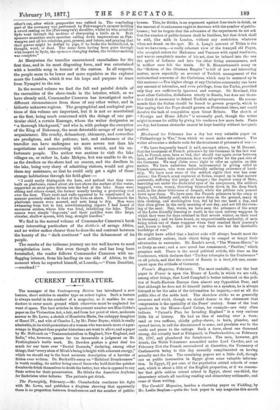The Fortnightly, February.—Mr. Chamberlain continues his fight with Mr. Lowe,
and publishes a diagram showing that apparently there is no proportion between drunkenness and the number of public-
houses. This, he thinks, is an argument against free-trade in drink, as the amount of drunkenness ought to decrease with the number of public- houses ; but he forgets that the advocates of the experiment do not ask that the number of public-houses shall be limitless, but that drink shall be sold, like milk in London, without any restriction whatever when not drunk on the spot. Mr. A. Lang's account of Titian is the best we have seen,—a really coherent view of the tranquil old Pagan, who accepted orders for Madonnas and Vennses with equal readiness, and was so completely master of his art, that he infused into the one the spirit of holiness and into the other living sensuousness, and in neither case felt the strain. Sir R. Blennerhasset's essay on the "Reform of the Ottoman Empire" is full of new and interesting matter, more especially an account of Turkish management of the ecclesiastical concerns of the Christians, which may be summed up in this sentence :—The higher clergy of any Christian community can have any amount of toleration, and even privilege, from the Turks, provided only they are sufficiently ignorant and corrupt. Sir Rowland, like most other Catholics, disbelieves utterly in Russia, but does not there- fore think it necessary to defend Turkish misgovernment. He recom- mends that the Sultan should be forced to govern properly, which is like saying that the Pope should govern on Protestant ideas, and would devolve the task of compulsion upon Great Britain. The sketch of Foreign and Home Affairs" is unusually good, though the writer might increase its utility by giving his readers a few more facts. Facts are dry, but human stomachs cannot be kept healthy without inorganic matter.


































 Previous page
Previous page